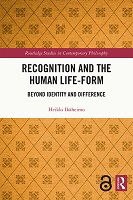Recognition and the Human Life-Form
Proposal review
Beyond Identity and Difference
Abstract
What is recognition and why is it so important? This book develops a synoptic conception of the significance of recognition in its many forms for human persons by means of a rational reconstruction and internal critique of classical and contemporary accounts.
The book begins with a clarification of several fundamental questions concerning recognition. It then reconstructs the core ideas of Fichte, Hegel, Taylor, Fraser and Honneth and utilizes the insights and conceptual tools developed across these chapters for developing a case for the universal importance of recognition for humans. It argues in favor of a universalist anthropological position, unusual in the literature on recognition, that aims to construe a philosophically sound basis for a discourse of common humanity, or of a shared human life-form for which moral relations of recognition are essential. This synthetic conception of the importance of recognition provides tools for articulating deep intuitions shared across cultures about what makes human life and forms of human co-existence better or worse, and thus tools for mutual understanding about the deepest shared concerns of humanity, or of what makes us all human persons despite our differences.
Recognition and the Human Life-Form will appeal to readers interested in philosophical anthropology, social and political philosophy, critical theory, and the history of philosophy. It also provides ideas and conceptual tools for fields such as anthropology, education, disability studies, international relations, law, politics, religious studies, sociology, and social research.
Keywords
particularism, personhood, recognition, philosophy, Honneth, universalismDOI
10.4324/9781003272120ISBN
9781032139999, 9781032223322, 9781003272120Publisher
Taylor & FrancisPublisher website
https://taylorandfrancis.com/Publication date and place
2022Imprint
RoutledgeSeries
Routledge Studies in Contemporary Philosophy,Chapters in this book
Rights
Metrics
Measures
Timeline
Geographical
Information

